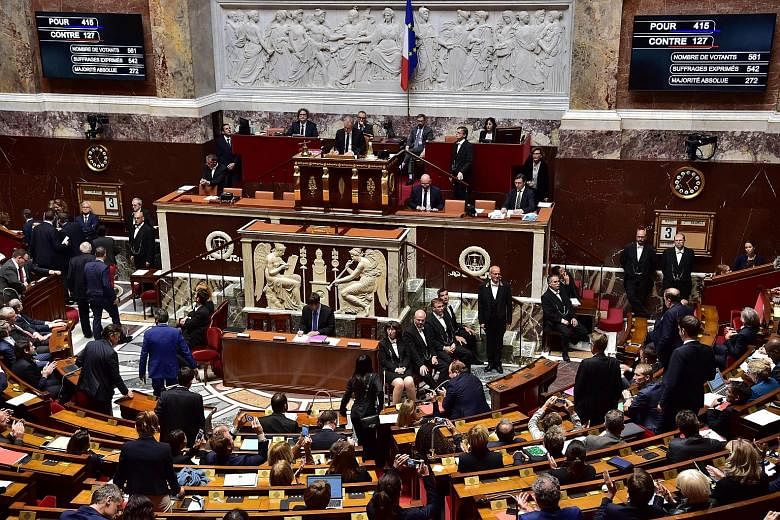PARIS • The French government has moved a significant step closer to making permanent some of the emergency measures put in place after the 2015 terror attacks, expanding the powers of security forces to combat terrorism in ways that critics say may also curtail civil liberties.
The legislation, approved by a wide margin in the Lower House of Parliament on Tuesday, codifies measures such as search-and-seizure and house arrest without judicial review - steps once considered exceptional - and effectively institutionalises a trade-off between security and personal liberty.
The Upper and Lower Houses of Parliament still need to smooth over differences in their versions of the Bill before a final vote this month, but most of the provisions are expected to remain.
The Bill, President Emmanuel Macron's first major piece of security legislation, would allow the government to lift the state of emergency imposed nearly two years ago while still being able to reassure the public that the state will exert, if anything, even greater vigilance.
Critics say the measures included in the law lack sufficient judicial oversight, relying instead on the judgment of security forces, whose suspicions could be based on faulty or thin intelligence.
They also say the new legislation could exacerbate racial profiling by law enforcement, undercutting Mr Macron's efforts to reach out to Muslims and minorities.
And they have questioned whether the provisions will improve the security services' ability to detect attacks beforehand.
Of the 3,600 house searches carried out in the first seven months after the state of emergency went into effect, only six resulted in terrorism-related criminal proceedings, according to information in a parliamentary report and a report by Human Rights Watch.
But Interior Minister Gerard Collomb justified the legislation as "a lasting response to a lasting threat". It is expected to take effect on Nov 1, when the emergency law is scheduled to end.
The legislation codifies, among other things, the power to restrict the movement of people if they are suspected of threatening national security or harbouring terrorist ideas. Before the state of emergency, such decisions would be made by a judge.
The government will also have more power to shut down mosques and other places of worship if intelligence agencies believe religious leaders are inciting violence in France or abroad or justifying acts of terrorism.
Similarly, the Bill allows searches of private property at the request of a departmental prefect, a government official, rather than requiring review by a judge or prosecutor.
The legislation also expands the areas where the police can set up checkpoints at will. It would allow them for up to 12 hours within a 22.5km perimeter around international airports, ports and train stations with international service.
Under another expanded power, local officials may restrict access, without court approval, to a public place or event if they deem them vulnerable to terrorists. The restrictions could last as long as a month, with an option to renew.
The anti-terrorism Bill has met with little resistance from the public, with people still on edge after the series of Islamist-related attacks and smaller incidents that have followed.
NYTIMES, REUTERS

